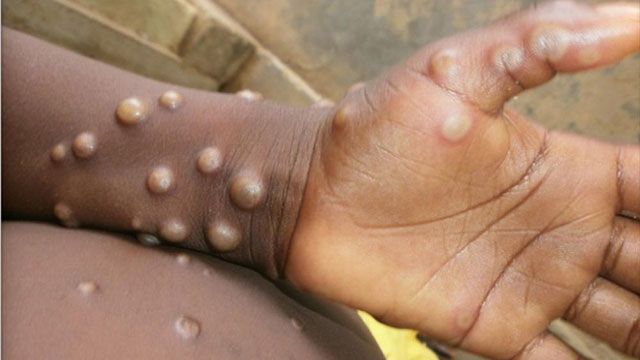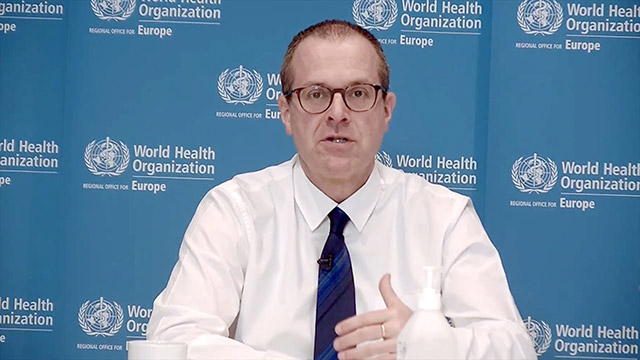Statement by Dr Hans Henri P. Kluge, WHO Regional Director for Europe
The WHO European Region remains at the epicentre of the largest and most geographically widespread monkeypox outbreak ever reported outside of endemic areas in western and central Africa. The learning curve has been steep over the past 2 weeks. We now have a critical opportunity to act quickly, together, to rapidly investigate and control this fast-evolving situation.
Today, I would like to outline what we have seen and learned, and what still needs to be understood, and to set us on the right path in tackling this challenge.
What have we seen and learned?
Read also
Even as new patients present every day, investigations into past cases show that the outbreak in our region was certainly underway as early as mid-April. Strong surveillance and diagnostic systems in several European countries, along with swift cross-border information-sharing mechanisms with the support of WHO and other partners, are to be commended for the outbreak coming to light.
Based on the case reports to date, this outbreak is currently being transmitted through social networks connected largely through sexual activity, primarily involving men who have sex with men. Many – but not all cases – report fleeting and/or multiple sexual partners, sometimes associated with large events or parties.
We must remember, however, as we have seen from previous outbreaks, that monkeypox is caused by a virus that can infect anyone and is not intrinsically associated with any specific group of people. The gay and bisexual communities have high awareness and rapid health-seeking behaviour when it comes to their and their communities’ sexual health. Indeed, we should applaud them for their early presentation to health-care services.
Rapid, amplified transmission has occurred in the context of the recent lifting of pandemic restrictions on international travel and events. The potential for further transmission in Europe and elsewhere over the summer is high. Monkeypox has already spread against the backdrop of several mass gatherings in the Region. Over the coming months, many of the dozens of festivals and large parties planned provide further contexts where amplification may occur. But they also provide powerful opportunities to engage with young, sexually active and globally mobile persons to raise awareness and strengthen individual and community protection.
We do not yet know whether the monkeypox virus can also spread from one person to another through semen or vaginal fluids, nor whether the virus could persist in these bodily fluids for longer periods of time.
We do know that most people who get monkeypox will have a mild and self-limiting but unpleasant and potentially painful disease that may last up to several weeks. We do not yet know what health impact there will be in individuals who can have severe outcomes from monkeypox, particularly young children, pregnant women and people who are immune-compromised.
What does an effective response in Europe look like?
As of now, an effective response to monkeypox will not require the same extensive population measures as we needed for COVID-19 because the virus does not spread in the same way. But – and this is important – we do not yet know if we will be able to contain its spread completely. For that, we need a significant and urgent reduction in exposures through clear communication, community-led action, case isolation during the infectious period, and effective contact tracing and monitoring.
Monkeypox has not been at the forefront of research and development in the field of infectious diseases. As such, tools to manage it – including readily available diagnostics, vaccines and therapeutics – are not likely to be immediately or widely accessible to countries. While one vaccine (MVA-BN) and one specific treatment (tecovirimat) were approved for monkeypox in 2019 and 2022 respectively, these countermeasures are not yet widely available.
Our goal is to contain this outbreak by stopping human-to-human transmission to the maximum extent possible.
We will interrupt transmission if we act now in:
- Actively engaging community groups and leaders and civil society organizations to increase awareness and share information on how people can reduce their risk of exposure, including by reducing the number of sexual partners they have.
- Strongly encouraging people – including young people regardless of gender and sexual orientation or activity – to increase their awareness of monkeypox and know what to do if they think they may have been exposed to the disease or have signs consistent with it.
- Supporting organizers and participating communities in upcoming mass gatherings across Europe to leverage these events to share accurate, practical and targeted information with participants.
- Equipping health facilities and public health teams with the knowledge and diagnostic capacities they need to rapidly identify, investigate and confirm cases.
- Ensuring monkeypox patients are informed about their need to isolate for the infectious period of their illness, refrain from sexual and other close contact with others, and are supported during their isolation.
- Swiftly tracing all contacts of cases and monitoring their absence of any relevant illness over 21 days. While the quarantining of contacts may not be necessary, twice-daily temperature checks and self-monitoring are critical.
- Using the currently available medical countermeasures fairly and equitably, based on level of risk, availability and the appropriateness of the intervention. We cannot allow ugly competition for constrained resources to mirror the early days of the COVID-19 pandemic.
By achieving these measures, we can help:
- demystify monkeypox, which is not a well-known disease in Europe, countering misinformation already being manifested across social media and other platforms;
- accelerate regional, country and community-led action to stop spread;
- provide equitably available diagnostics and medical countermeasures such as vaccines and antivirals to affected communities and other relevant constituencies;
- ensure that no one is stigmatized, or it will damage our collective response.
We have learned a lot from our COVID-19 experience, in terms of cross-country collaboration and information-sharing mechanisms, heightened surveillance, and risk communication as a public health intervention, including at the community level. We have also seen how misinformation amplified online and through other sources can lead to negative public health outcomes.
All of these lessons can and should better inform our actions going forward. Let us therefore bring government, civil society and health partners together to tackle this public health challenge decisively and effectively, guided at all times by science and medicine, and imbued with respect and compassion.

























































